
Pacific Islands Students Fighting Climate Change
Stilla havsöarna
Huvudkontor: Suva, Fiji
Grundat: 2019
Webbplats: pisfcc.org
Instagram: @pisfcc
Facebook: Pacific Islands Students Fighting Climate Change
X: @pisfcc
Kontakta oss för intervjuförfrågningar och mer information.
Awarded
Pacific Islands Students Fighting Climate Change
shared with
“För att ha tagit uppmaningen om klimaträttvisa till Internationella domstolen (ICJ), och därmed gjort överlevnad till en fråga om rättigheter samt klimatåtgärder till ett juridiskt ansvar.”
Pacific Islands Students Fighting Climate Change (PISFCC) är en studentorganisation som tog klimatkrisen till Internationella domstolen (ICJ), i planetens och mänsklighetens namn. Organisationen grundades 2019 av 27 juridikstudenter som utformade kampanjen i ett klassrum vid University of the South Pacific i Vanuatu. För dem var klimatförändringarna inte något abstrakt: i Stilla havet ödelägger cykloner ekonomier, stigande hav driver familjer från sina hem och saltvatten förstör grödor.
Efter sex års kampanjande kulminerade PISFCC:s outtröttliga arbete, som en del av en global rörelse med mänskliga rättigheter i centrum, i en historisk seger vid Internationella domstolen (ICJ) i juli 2025. Domstolen lämnade ett rådgivande yttrande som bekräftade att stater har bindande rättsliga skyldigheter att förebygga klimatskador, skydda mänskliga rättigheter, ge kompensation samt säkra nutida och framtida generationers möjligheter att leva. Utslaget var ett genombrott i internationell rätt och öppnade en ny väg för klimaträttvisa globalt.
Kärnan i deras strategi var att samla in vittnesmål runt omkring stillahavsöarna, en av de regioner som bär minst ansvar för klimatförändringarna men redan nu är en av de som betalar det högsta priset. Genom att föra fram dessa vittnesmål om förlust, motståndskraft och krav på rättvisa in i internationell rätt, såg PISFCC till att verkliga berättelser från frontlinjen formade ICJ:s beslut.
PISFCC delar 2025 års Right Livelihood-pris med Chamorro-juristen och författaren Julian Aguon, vars juridiska team drev ärendet framåt. Tillsammans visar deras partnerskap mellan ungdomlig mobilisering och juridisk påverkan hur kollektiv handling kan förändra system.
It’s not about us. It’s about everyone who deserves that win. We row together. The alternative is unthinkable. If we stop, we lose everything.
Pacific Islands Students Fighting Climate Change
Biography (in English)
PISFCC is a youth-led Pacific organisation that transformed lived frontline realities into a world-shaping legal case, confronting a crisis threatening identity, sovereignty and survival.
By placing human rights at the centre of climate law, PISFCC — in partnership with allies like Julian Aguon — unlocked a new era of accountability, solidarity and hope, reshaping how the world will fight climate change.
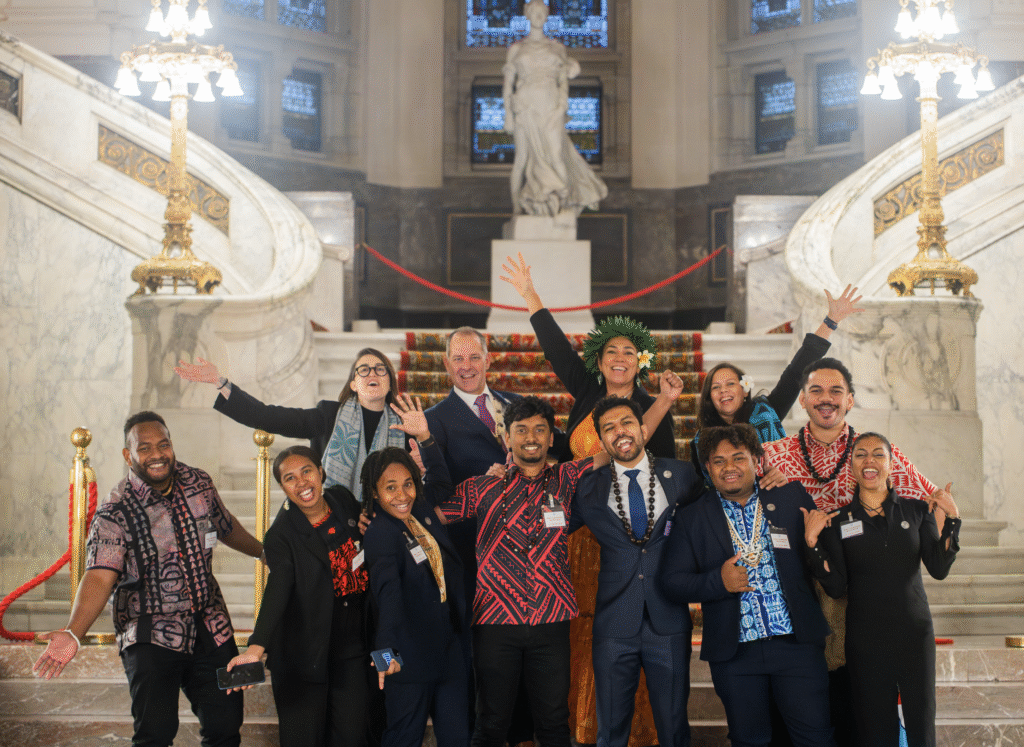
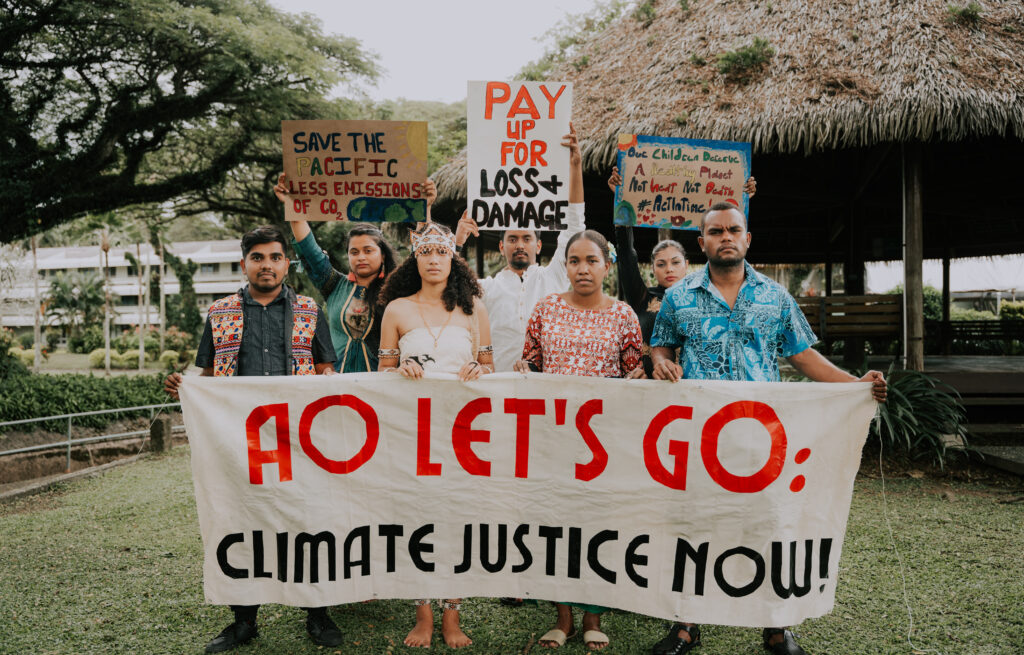
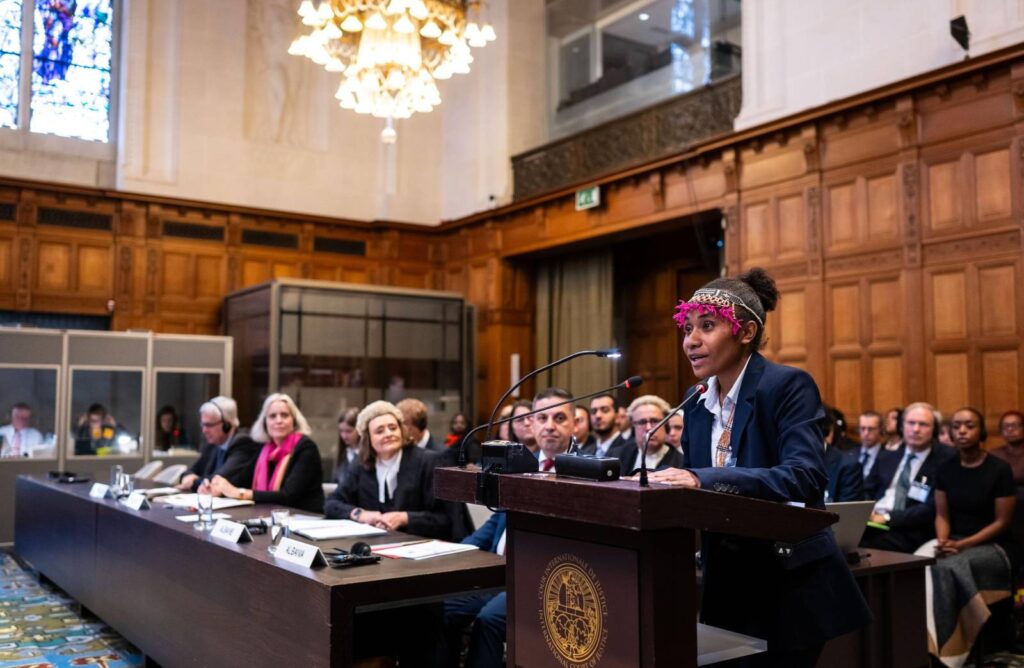
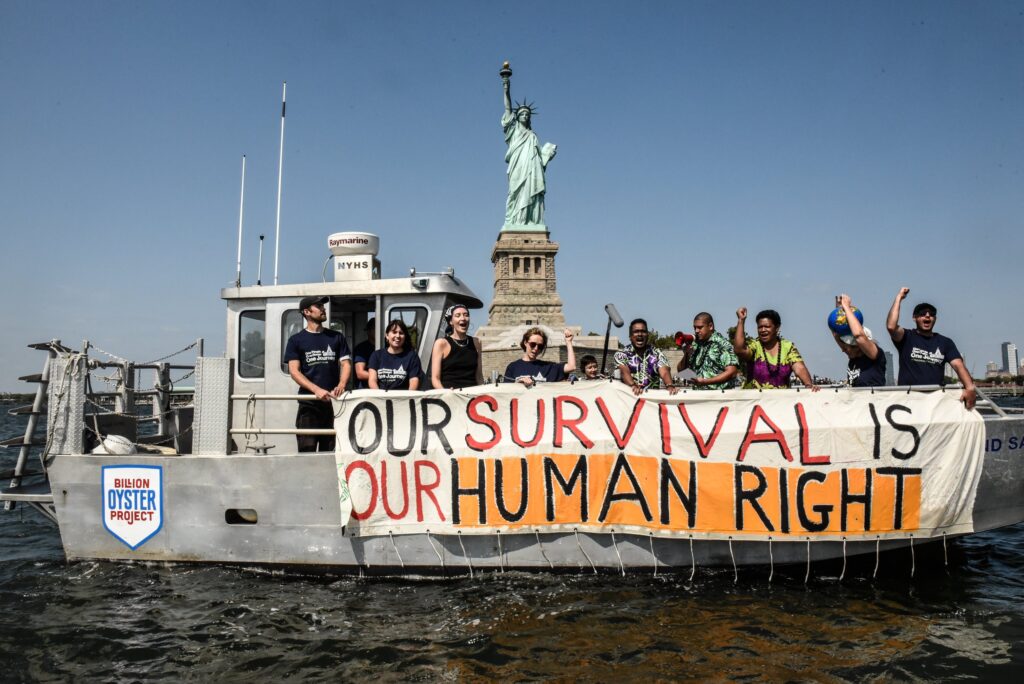
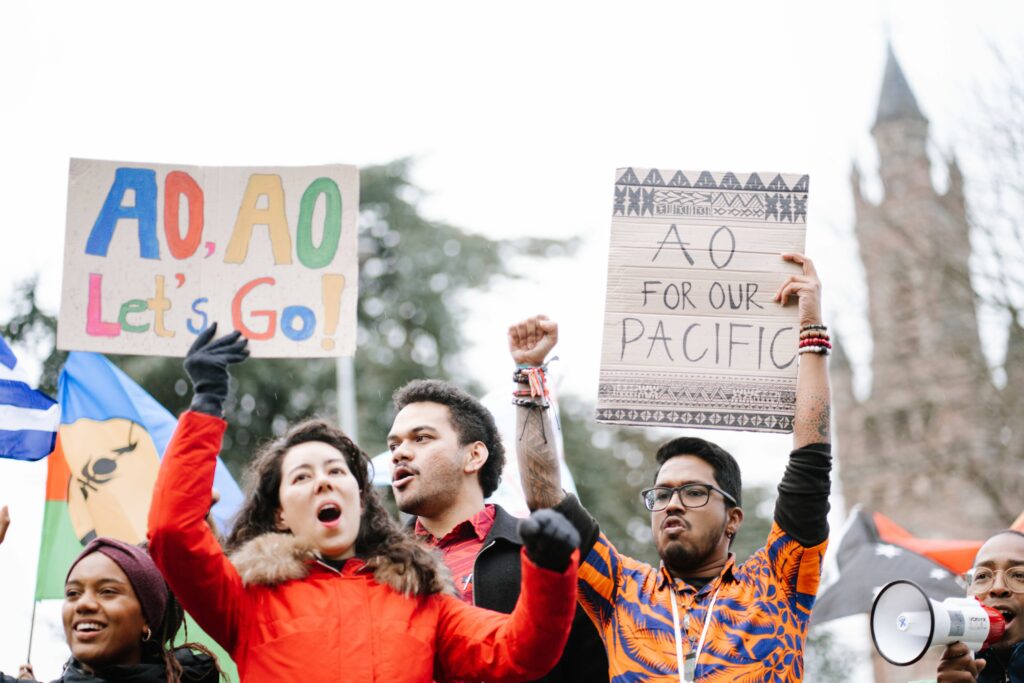
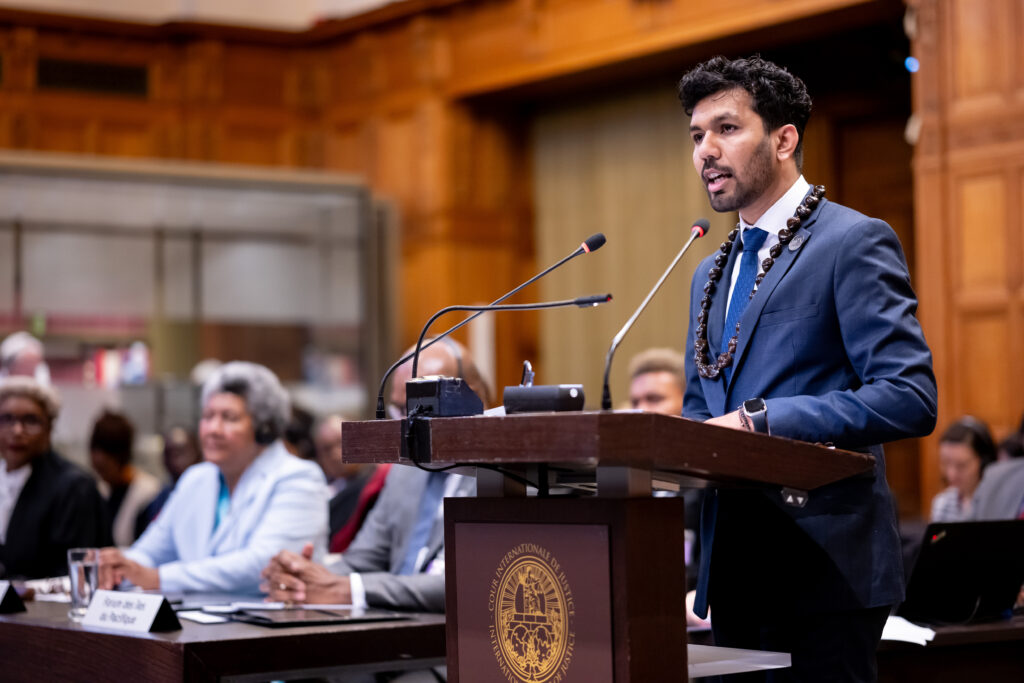





While Others Imagine, We Live It
For those living on the frontlines of climate change, its effects are often felt long before they learn the term itself.
In the Reef Islands of the Solomon Islands, PISFCC President Cynthia Houniuhi remembers growing up surrounded by abundance: fish in the reef and fruit from the trees. Yet by the time she reached secondary school, the changes were stark.
“We would travel back to my dad’s village during holidays and the sight that would greet us went from being the most beautiful place to a place where the houses had their posts already in the water. I didn’t know the word ‘climate change’ yet, but I saw what it meant,” she said.
Across the Pacific, communities echoed these realities: coral bleaching, salinised gardens, and graves washed away. “We contribute almost nothing to emissions,” Houniuhi says, “but our whole selves, our homes, our languages, our identities are at stake.” For PISFCC’s Director Vishal Prasad, the lesson was clear: building sea walls could never be enough; only transformational change could match the scale of the crisis.
An Idea Too Big for One Classroom
Frustrated by the slow pace of global negotiations, the lack of real political will, and the refusal of powerful states to commit to a full fossil fuel phase-out — even as science warned of a closing window before 2030 — they decided to act.
The spark was ignited in a law lecture in 2019. Twenty-seven students asked, why were international regimes so unambitious? Their discussion landed on the role of the International Court of Justice (ICJ), the world’s highest court, which adjudicates disputes among states.
“What could be more ambitious than asking the ICJ itself to speak?” Houniuhi recalls.
Collectively, they drafted a question that placed human rights and intergenerational equity at the centre: “What are the obligations of States under international law to protect the rights of present and future generations against the adverse effects of climate change?” This framing later shaped the resolution adopted by the UN General Assembly in March 2023, which referred a version of the question to the Court: “What are the obligations of States under international law to ensure the protection of the climate system and other parts of the environment for present and future generations?” The students then together formed the youth-led organisation Pacific Islands Students Fighting Climate Change to take the ICJ AO campaign forward.
From that classroom, they wrote letters, drafted briefs and persuaded leaders. Vanuatu became the first government to adopt their call, beginning a partnership that lasted through to the ICJ hearings. When the Covid-19 pandemic halted travel, PISFCC helped create the World’s Youth for Climate Justice (WYCJ). This organisation became the international youth arm of the campaign, building global awareness, coordinating advocacy across continents and connecting their Pacific struggle to a wider movement. They also helped convene a civil-society alliance of over 1,700 organisations.
Global collective action was much needed for the campaign to get off the ground and make it to the ICJ chambers. For the Court to consider such a request, member states of the UN General Assembly need to refer the question, requiring vast international support. Under Vanuatu’s leadership, the UN General Assembly adopted a resolution by consensus in 2023 requesting the Court’s opinion clarifying international legal obligations to protect the climate system and address climate damage.
It was nothing short of David versus Goliath: young law students and one small island state forcing the world’s most powerful nations to answer for the climate crisis.
For Houniuhi, the delivery of the International Court of Justice’s Advisory Opinion carried the weight of countless sacrifices and the voices of all who had testified. She described it as a mixture of grief and relief, the sense of finally being heard. Prasad describes it as “the biggest push for climate justice in decades, turning hope into something tangible.”
Speaking for Our Ancestors, Our Islands, Our Future
PISFCC insisted that the law must be infused with lived experience. They annexed community testimonies from the Solomon Islands, Fiji and Tonga to state submissions, created the Witness Stand video campaign, and convened a People’s Assembly whose petition Prasad carried into the Great Hall of Justice.
When the hearings opened at the International Court of Justice, Houniuhi and Prasad both addressed the judges: the first time Pacific youth had spoken directly to the ICJ. Houniuhi delivered a six-minute opening statement in both her native language and in English, moving the Court with the power of her words. She drew inspiration from her grandmother, who had reminded her: “You see the islands — that’s ours.” Those words, she later said, gave her strength to speak not only for herself, but for generations past and future.
“The emotion came from understanding the sacrifices of so many, and from knowing their voices were in that courtroom with me,” she remembers.
Their speeches also showed something larger: that there is space in the world for campaigns that are both as profoundly ambitious as authentic, led not by performance, but by people true to themselves and their communities.
The Ruling That Turned the Tide
On 23 July 2025, the ICJ delivered its opinion. It confirmed that states have binding obligations under international law to prevent climate harm, cooperate to protect vulnerable peoples, and align their actions with the 1.5 degree Celsius goal and best available science. Crucially, it established that breaches entail consequences: cessation of harmful conduct, and full reparations, from ecosystem restoration to compensation and recognition. Although ICJ advisory opinions are not legally binding, they carry great authoritative weight as interpretations of international law.
“It’s the first time the ICJ has spoken on climate change, and it delivered one of the most progressive advisory opinions in the Court’s history,” Prasad says. “It shifts climate action from voluntary pledges to legal obligations. It gives us a tool to hold states accountable, everywhere.”
For frontline communities, the opinion is both a shield and a compass, affirming that their struggles are not charity cases but matters of right.
An Alliance that Made World History
The campaign’s strength lay in partnership. Among PISFCC’s and WYCJ’s closest allies was Chamoru lawyer and writer Julian Aguon, who shares the Award. While PISFCC mobilised youth, governments and global civil society, Aguon and his team at Blue Ocean Law advanced the legal strategy, drafting questions and defending the resolution text against attempts to weaken it.
Working in parallel, each organisation played a distinct but complementary role: campaigning created the political momentum, while legal experts safeguarded the integrity of the case.
The shared award recognises that combination: the fire of youth-led mobilisation and the rigour of legal advocacy. Together, they brought “the world’s biggest problem to the world’s highest court.”
Holding the Line: No Choice but to Keep Fighting
The opinion is not the end. “Now comes the hard part: operationalising it,” says Prasad. PISFCC is pressuring governments to align their national climate plans with the Court’s baseline, accelerate the phase-out of fossil fuels and make climate finance grant-based, so frontline communities receive support without being trapped in debt. For Pacific peoples, this means survival funding that is accessible, equitable and rooted in justice rather than loans. PISFCC is also building regional youth capacity to lead future advocacy and preparing for upcoming UN climate negotiations, insisting that talks rise above — never fall below — the ICJ’s floor.
The opinion is more than symbolic. It establishes that the 1.5 degree Celsius goal is binding and that national climate pledges, known as Nationally Determined Contributions, or NDCs, must be grounded in science and human rights. Prasad explains that the next five years will be critical: the decisive window in which either the world bends emissions downward or locks in catastrophe.
“For the first time, the law says states can’t just promise. They are obliged,” he said.
The journey has been exhausting. All leaders describe sleepless nights, time away from families, and the strain of carrying the weight of their communities’ expectations. Yet in the midst of this, they also graduated as lawyers, and Houniuhi has returned to the very university where the campaign began, now teaching the next generation.
“The alternative is unthinkable. If we stop, we lose everything. That’s why we keep going. It’s not about us. It’s about everyone who deserves that win. We row together.” Houniuhi and Prasad, speaking to their shared sense of collective duty.
Recognition belongs to many: classmates, communities, allies across continents. Through their and PISFCC’s shared story, the world glimpses what stubborn optimism, rigorous law and collective courage can achieve.